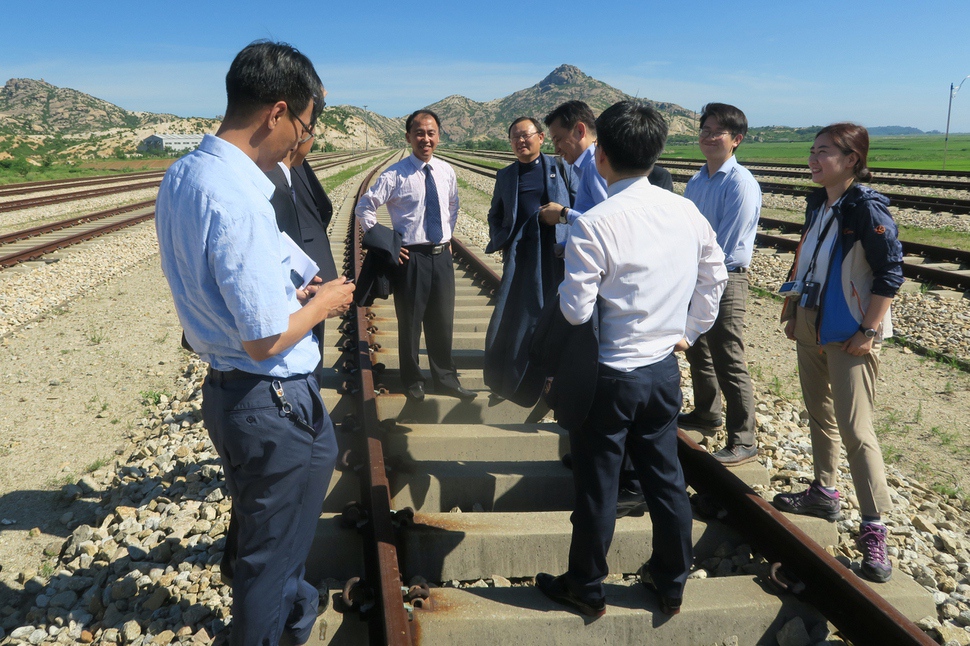 |
|
South and North Korean railway experts conduct a joint inspection of a track near Kamho Station, Kangwon Province, along the East Sea line on July 20. (provided by the Ministry of Unification)
|
Both sides likely finishing coordination on sanctions issues in regard to groundbreaking ceremony
The South Korean government said on Oct. 18 that it is looking forward to a “positive outcome” from close discussions with Washington on plans to hold a groundbreaking ceremony for linkage of inter-Korean railways and roads. Differences between the two sides over the issue have led to claims of “cracks” developing in their coordination. “We are cooperating closely with the US, and we expect a positive outcome,” said Blue House spokesperson Kim Eui-kyum in a briefing that day on the decision to hold a groundbreaking ceremony in late November or early December for the linkage and modernization of South and North Korean railways and roads. South and North Korea previously agreed at high-level talks on Oct. 15 to hold the groundbreaking ceremony in November or December. Where asked for comment by the press, the US State Department said improvements in inter-Korean relations could not move separately from resolution of North Korea’s nuclear program. In particular, it said it expected “all member states to fully implement UN sanctions, including sectoral goods banned under UN Security Council resolutions” – a message some analysts saw as voicing concerns that Seoul was getting ahead of Washington on the matter. Seemingly contradictory remarks by each side’s ambassador Claims of cracks in the two sides’ cooperation were fed by seemingly contradictory remarks on Oct. 17 by South Korean Ambassador to the US Cho Yoon-je and US Ambassador to South Korea Harry Harris at respective events in Washington and Seoul, with Cho stressing that inter-Korean relations and denuclearization “can’t always move mechanically at the same speed” and Harris arguing that inter-Korean dialogue and North Korean denuclearization must be tied together, with Seoul and Washington approaching the situation “with a common voice.” The Blue House’s predictions of a “positive outcome” were taken as signaling that the two sides are finishing their coordination over the issues of sanctions violations in connection with the groundbreaking ceremony for the inter-Korean railway and road linkage and modernization effort. “We certainly understand patriotism, but we would like to ask people to stop worrying now,” Kim Eui-kyum said the previous day in response to domestic concerns about fissures in the two sides’ cooperation. His message was seen as expressing confidence in the administration’s execution of the agreement between the South and North Korean leaders according to discussions with the US within a “framework of mutual consideration and cooperation” – even if Seoul and Washington do not agree 100 percent of the time on the rate of progress in inter-Korean relations. South Korean President Moon Jae-in and North Korean leader Kim Jong-un agreed in their Pyongyang Joint Declaration last month on a firm schedule of holding the groundbreaking ceremony for linkage of the East and West Sea railway lines and roads “within this year.” Abiding by framework of UN sanctions on North Korea Regarding the possibility of the agreement’s implementation resulting in violation of sanctions against North Korea, the Ministry of Foreign Affairs said on Oct. 16 that it was “being pursued under a principle of abiding by the framework of North Korea sanctions.” “We have held close discussions with the US and plan to continue those discussions going ahead,” the ministry said. The administration has also reportedly been in discussions with Washington, approaching the matter as one where – as Cho said on Oct. 16 – Seoul could “play the role of catalyst in North Korea-US relations in the event that inter-Korean relations get a bit ahead of North Korea-US negotiations.” In an Oct. 17 talk with foreign correspondents in Washington, Cho addressed the alarm in the US over differences in the rate of developments in inter-Korean and North Korea-US relations. “The leverage that is being established with North Korea through progress in inter-Korean relations is becoming a crucial diplomatic asset in terms of denuclearizing the Korean Peninsula and establishing peace,” he said. By Hwang Joon-bum, Washington correspondent, and Kim Bo-hyeop, staff reporter Please direct comments or questions to [english@hani.co.kr]






